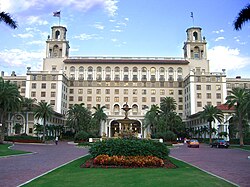The Breakers (hotel)
Breakers Hotel Complex | |
 | |
| Location | South County Road, Palm Beach, Florida |
|---|---|
| Area | 105 acres (42 ha) |
| Built | 1925[2] |
| Architect | Schultze & Weaver[2] |
| Architectural style | Renaissance Revival,[2] Late Nineteenth and Twentieth Century Revivals, Shingle Style |
| NRHP reference No. | 73000598[1] |
| Added to NRHP | August 14, 1973 |
The Breakers Hotel is a historic hotel in Palm Beach, Florida, United States. First known as The Palm Beach Inn, it was opened on January 16, 1896 by oil, real estate, and railroad tycoon, Henry Flagler, to accommodate travelers on his Florida East Coast Railway. It occupied the beachfront portion of the grounds of the Royal Poinciana Hotel, which Flagler had opened beside Lake Worth Lagoon facing the inland waterway in 1894. Guests began requesting rooms "over by the breakers," so Flagler renamed it The Breakers Hotel in 1901. The wooden hotel burned on June 9, 1903 and was rebuilt, opening on February 1, 1904. Rooms started at $4 a night, including three meals a day. Because Flagler forbade motorized vehicles on the property, patrons were delivered between the two hotels in wheeled chairs powered by employees. The grounds featured a nine-hole golf course. The hotel is located at 1 South County Road.
Pre-Negro leagues, Winter League baseball team
In the winter of 1915/1916, the Breakers Hotel hired the services of Cyclone Joe Williams and many fellow team members of the Lincoln Giants pre-Negro League baseball team to take on another pre-Negro League baseball team made up of Indianapolis ABCs players hosted by the Royal Poinciana Hotel. The games hosted Negro League baseball stars of the day, including Ben Taylor, C.I. Taylor, Candy Jim Taylor, John Donaldson, Ashby Dunbar, Jim Jeffries, Jimmie Lyons, Bill Francis, Blainey Hall, Dick Wallace, Louis Santop, and Spot Poles.[3] One newspaper column claimed that "Astors, Vanderbilts, Morgans, and hundreds of others, who never see a ball game outside of Palm Beach... (are) rooting hard for their favorite team.[4]
Second fire
Twelve years after Flagler's death, on March 18, 1925 The Breakers Hotel burned again, the fire was started by an electric curling iron that had been left on. The architectural firm hired by the Flagler heirs, Schultze and Weaver, modeled its 550-room replacement after the Villa Medici in Rome, this time working with New York-based Turner Construction Company and a local well-known Palm Beach contractor, Eugene Hammond, who built the first theater in West Palm Beach and worked on the Palm Beach estate built for Rodman Wanamaker by Addison Mizner (that would become a Kennedy winter retreat in 1933).
The contractors decided to abandon the wooden construction for fireproof concrete. Built by 1,200 construction workers, the hotel reopened on December 29, 1926 to considerable acclaim. The lobby ceiling was painted by Alexander Bonanno, a classically trained New York City artist who taught at Cooper Union.
Today, the hotel and grounds occupy 140 acres (57 hectares) beside the Atlantic Ocean.
This hotel influenced the Hotel Nacional in Havana, Cuba.
The Breakers Hotel Complex was listed on the National Register of Historic Places in 1973. In 1973, the 105-acre (42 ha) listed area included 15 contributing buildings and one other contributing object.[1] On April 18, 2012, the AIA's Florida Chapter ranked the hotel seventh on its list of Florida Architecture: 100 Years. 100 Places.[5]
Dining
There are several dining options on or near the hotel that are owned by The Breakers: HMF, Flagler Steak House, The Circle, The Italian Restaurant, The Seafood Bar, The Ocean Grill, The Beach Club and an offsite restaurant, Echo. HMF has been a recipient of the Wine Spectator Grand Award since 1981.[6]
References
- ^ a b "National Register Information System". National Register of Historic Places. National Park Service. March 13, 2009.
- ^ a b c "The Breakers". Florida Heritage Tourism Interactive Catalog. Florida's Office of Cultural and Historical Programs. 2007-02-28.
- ^ "Palm Beach Notes" Indianapolis Freeman, Indianapolis, Indiana, February 12, 1916, Page 4
- ^ "Palm Beach Weekly Review" Indianapolis Freeman, Indianapolis, Indiana, Saturday, February 19, 1916, Page 5, Columns 5 to 7
- ^ Florida Architecture: 100 Years. 100 Places
- ^ "HMF". Wine Spectator. 2015-01-01. Retrieved 2015-08-19.
- History of The Breakers
- Florida, DK Eyewitness Travel Guides, 2004, pg. 119
External links
- The Breakers Hotel
- Palm Beach County listings, Florida's Office of Cultural and Historical Programs
- "It's De Limit" Forbes article by Finn-Olaf Jones on The Breakers' architects Schultze & Weaver, April 24, 2006
- The Breakers Historical Timeline
- Historic American Buildings Survey (HABS) No. FL-228, "The Breakers Hotel, South County Road, Palm Beach, Palm Beach County, FL", 33 photos, 1 color transparency, 1 measured drawing, 28 data pages, 3 photo caption pages, supplemental material
- HABS No. FL-223, "The Breakers Hotel, Cottage, South County Road, Palm Beach, Palm Beach County, FL", 6 photos, 7 data pages, 1 photo caption page, supplemental material
- Florida East Coast Railway
- Historic American Buildings Survey in Florida
- Historic Florida architecture 1989 AIA survey listings in Palm Beach County
- Hotel buildings completed in 1925
- Hotel buildings on the National Register of Historic Places in Florida
- Hotels in Palm Beach, Florida
- Mediterranean Revival architecture in Florida
- National Register of Historic Places in Palm Beach County, Florida
- Railway hotels in the United States
- Seaside resorts in Florida
- Shingle Style architecture in Florida



